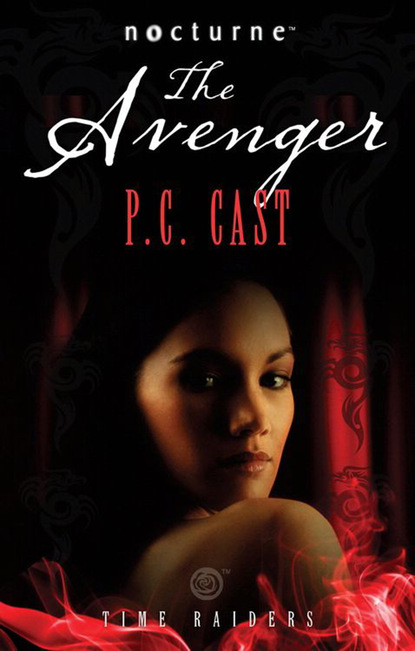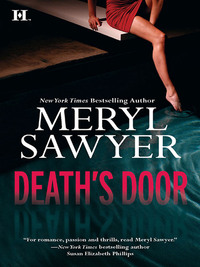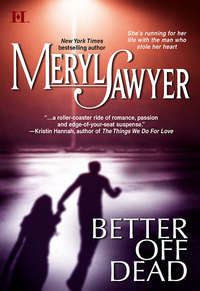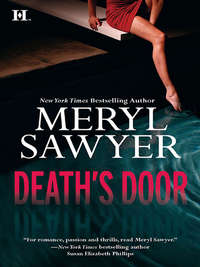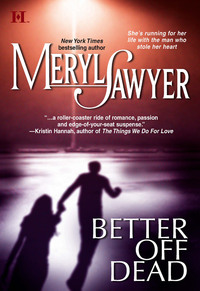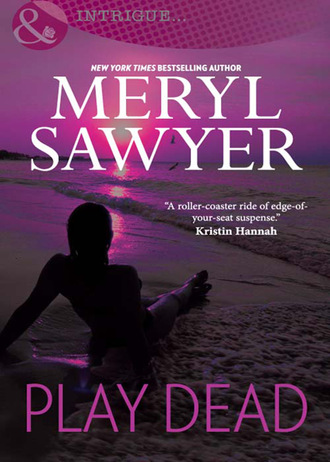
Полная версия
Play Dead
“As far as I know,” the detective assured her.
There was something ominous about the way the man responded. It was as if the guy thought they should know why he was there. Trent was nervous, which was unusual when he was high. He sucked in a deep breath and held it in his lungs to clear his head. He let it out slowly so no one would notice.
They walked up the flagstone path to the massive double doors that led into the house. For a second, Trent wondered what they thought. The place was impressive, he had to admit, but it wasn’t anything compared with the Pelican Point mansion where they’d attended the party tonight. Trent hoped to move there—just as soon as his parents’ estate went through probate and he received his share.
If the economy tanked any more, he’d need the money from the estate to keep the company his father started afloat. And pay the mortgage on this house. The cops probably didn’t envy him. No doubt they were glad they didn’t have this overhead.
Trent unlocked the door and disarmed the security system. The cloying scent of too many roses bombarded his nostrils. Courtney insisted on having five dozen white roses arranged in a crystal vase in the entry hall each week even though he’d told her to cut back. Above the spacious marble entry a vaulted ceiling rose to the second floor. Dead in the center of the foyer was the spectacular floral arrangement on an antique table.
He took Courtney’s hand and led the group into the spacious living room that was rarely used. He punched the control panel on the wall to make the low-level lighting in the room brighter.
Trent settled Courtney on one of three sofas that faced a fireplace befitting a castle. The men took chairs nearby. The detective settled back, but the uniformed officer teetered on the edge of the silk chair that some fancy decorator had found, as if the officer believed his gabardine slacks would snag the delicate fabric.
Courtney suddenly began to sob loudly. Now what? Trent wondered.
“Honey, they said Timmy is okay. Stop crying.”
“Th-this … is b-bad news. I—I can tell.”
“Now, Courtney—”
“I’m afraid your wife is correct,” the detective said in a level voice.
The words were like a shard of glass entering Trent’s spongy brain. This reminded him of the night a little over a year ago when he’d received the telephone call that his father’s plane had crashed, killing Trent’s father and stepmother. Allison’s death was no loss, but Trent had been devastated that his father—his idol—was no longer around to guide him.
“I understand you’re next of kin to Hayley Fordham.”
It took a second for the words to register. He’d always thought of Hayley as “the step,” never his next of anything, but he realized the death of his father and Hayley’s mother meant that he was Hayley’s closest relative except for her aunt Meg.
“Oh, no,” wailed Courtney. “Has Hayley been in an accident?”
Trent didn’t have much use for his stepsister beyond her value as a designer for Surf’s Up. That role had taken on greater significance when Hayley’s mother Allison had been killed with Trent’s father in the plane crash.
He had to admit Hayley had been instrumental in aligning their company with Mixed Martial Arts. Illegal in many states, MMA—the human equivalent of cockfighting—was the fastest growing sport in America. Hayley had picked up on this multibillion dollar business and designed a line of clothes for The Wrath to wear. The Wrath was National MMA champion and one scary dude, but he was to MMA what Tony Hawk was to skateboarding. The MMA line kept the bucks rolling in just when surfboards were tanking, another victim of cheap Asian imports and a nosediving economy.
Trent might not care for his stepsister, but he admired her business sense. His wife was another story. Courtney adored Hayley. An artist-to-artist thing, he supposed.
“What’s happened?” Even as he asked the question, Trent knew this couldn’t be a simple accident. A telephone call would have done the trick. His skin prickled with anxiety as reality began to penetrate his usually sharp mind.
“I’m afraid,” the detective began in that same irritatingly level tone, “she’s been killed.”
“Oh, my God! No!” Courtney jumped to her feet. “Tell me it isn’t true.”
Trent pulled her back down beside him. Breath gushed from his lungs in short bursts. His mind struggled to get a grip on what he’d just been told. Her death changed—everything. For the better, he had to admit.
“Her car was blown up by a bomb at about eight o’clock this evening,” the uniformed officer informed them in a voice barely loud enough to be heard over Courtney’s sobs.
“What? That’s terrible—a tragedy.” Trent shaded the truth. He’d be a hell of a lot richer with Hayley out of the way. “Car bombs happen in the Middle East, not Newport Beach.” He tried to keep his mind off the money, adding, “Besides, who would want to kill Hayley?”
“DEAR LORD, WHAT IS the world coming to?” Meg Amboy asked the nurse who’d brought her breakfast just after dawn. Along with it came her medication and the morning paper. “Did you see there was a car bombing right here in Newport Beach last night?”
“Umm-hmmm,” the middle-aged woman with a chest like the prow of a battleship responded. “It was out by the airport. That’s Costa Mesa.”
Meg noticed the nurse had dismissed the incident as if it had happened on another planet. Typical attitude around Twelve Acres. The staff had been trained to be elitist. Newport had money and cachet while Costa Mesa, which bordered on Newport, was decidedly middle class with an area that could only be termed a barrio. Meg knew most of the help in the kitchen and the housekeepers lived in Costa Mesa or just beyond in Santa Ana.
Meg prided herself on not being a snob. True, she spent her money on the best assisted-living facility she could afford because she knew she didn’t have much longer to live. But she remembered with fondness growing up poor and earning her own way. Making a fortune with no one’s help.
The battleship nurse, whose name Meg always failed to remember even though Meg had been at Twelve Acres for two years, left. Meg went back to the paper, content to read it until it was time to go downstairs for a second cup of coffee with Conrad Hollister. After they’d finished, she would walk beside his wheelchair to their morning game of bridge.
“Conrad,” she whispered and lowered the paper. She stared out at the craggy shoreline framed by her huge window. The rampartlike bluffs had been weathered by wind and the unrelenting surf. Now scrims of early morning mist clung to the shore. Short trees bowed by the elements stooped like hunchback sentinels along the tops of the bluffs where mansions were perched.
The view was breathtaking but she often experienced a haunting, solitary feeling when she gazed at the sweep of the deep blue sea. It made her lonely, which was an emotion she’d rarely experienced when she was younger, but she had more time to reflect now. Too much time.
“What might have been?” she whispered to herself. What if she’d met Conrad Hollister ten, twenty, even thirty years ago?
Meg refused to allow her thoughts to stray in this direction. At eighty-five, she had the same sharp mind that had guided her as she amassed an empire in real estate. She wouldn’t be here if she didn’t have a heart that refused to recognize her brain was still young. Why dwell on what might have been when she had accomplished so much?
Conrad was nothing more than an intellectual companion. They enjoyed many of the same things, like competitive bridge, but they weren’t lovers and probably never would have been. Still, once in a while thoughts crept into her mind and she speculated like an old fool.
“It’s people who matter,” she quietly assured herself, then realized she’d been talking to herself more and more. There were plenty of folks at Twelve Acres to talk to—besides Conrad—but Meg missed her baby sister. Allison had been killed in a plane crash. Until she was gone, Meg hadn’t realized how much she counted on conversations with her sister.
There was Hayley, of course, but her niece had her own life. She visited often, making time for an old woman. Hayley was going to Santa Barbara, then on to San Francisco to buy fabric for the fall line of clothes she was designing. It would be ten days or so before she returned. Until then, Meg would be on her own.
CHAPTER TWO
FARAH FORDHAM pulled her sleek black Ferrari into the Twelve Acres parking lot just after 6:00 a.m. The facility was situated on prime real estate on Pacific Coast Highway, overlooking the coastline between Newport Beach and Laguna Beach. Why they called it Twelve Acres was beyond her; the place was a little over an acre of Cape Cod–style buildings shaded by stately palms.
When Trent had called her at three this morning, he’d insisted she deliver the news of Hayley’s death to her old battle-ax aunt. Before he’d gotten that far, Trent had asked, “Did you do it?”
“Do what?” Farah had been engaged in some extremely kinky sex—she loved being the dominatrix—with Kyle, her boyfriend.
“Kill Hayley.”
“That’s a hell of an idea.” Their father’s estate was currently in probate. As a CPA, Farah knew how big a chunk the state would claim, then the rest would be split three ways. Two would be better. One would be ideal.
Despite having a successful business, Farah was overextended and trapped in the economic downturn. To make matters worse, her boyfriend was a residential real estate developer. His career was in limbo and she was supporting him.
“Seriously, Hayley was blown to kingdom come by a car bomb.”
“You’re kidding.” She tried to sound upset but doubted she’d fooled her brother.
“I’m not joking. I’ve got to go to the station and give a statement. You have to tell Aunt Meg.”
Great! Just great! Farah would rather be interviewed by the police than deliver bad news to Meg Amboy. The old crone was giving ninety a hard shove but she was still tough, the same woman who’d turned meager funds into a real estate empire by buying up what people assumed was worthless land east of L.A. Soon urban sprawl drove hundreds of thousands of people to what was laughingly called the “Inland Empire.”
As far as Farah could tell, Meg Amboy loved two things. Money and Hayley. The old biddy had a heart condition; the news would probably kill her. The thought made Farah grin as she slithered out of the sports car she really couldn’t afford but loved with a passion. What would happen to Meg’s money with Hayley gone?
Farah wondered if she could ingratiate herself with the old biddy. Considering the money involved and Meg’s lack of relatives, it wouldn’t hurt to try.
MEG STARTED at the knock on the door to her suite. She made her way to the door and opened it. Farah Fordham stood there dressed in an expensive suit with a handbag that probably cost more than any nurse at Twelve Acres made in a month. What was she doing here?
“May I come in?”
Meg decided these were probably the first words Farah had ever directed to her other than a polite hello and goodbye at family functions. She eased the door open and watched the young woman saunter in. Meg saw something of herself in Farah—not in the arrogant manner, but in the self-made young woman who’d put herself through college. Her brother, Trent, had ridden on his father’s coat tails, going into the family business. Not Farah; she had her own CPA firm.
“Let’s sit down,” Farah said, looking as if she were facing a firing squad.
Meg’s stomach heaved then took a sickening plunge. She staggered backward toward the small sofa where she’d been reading the paper. “Hayley,” she cried. “What’s happened?”
Farah had hold of both Meg’s arms. She eased her down on the sofa before speaking. “There’s been an accident.”
Relief washed through Meg, leaving her weak; blood pounded like hail in her ears. An accident. Well, she could deal with that. This might mean a prolonged stay in the hospital or special care. That’s what money was for; she could help her niece recover.
Then she read Farah’s calculating blue eyes. Like a bolt of lightning, the truth almost knocked her to the floor. “Hayley’s dead,” she managed to whisper.
“I’m afraid so.” Farah sat in the wingback chair next to the sofa. “I’m sorry. I wish …”
“How? A car accident?” she asked, but Farah shook her head. “How? I want to know.”
A suffocating silence filled the room, finally Farah said, “A car bomb.”
Suddenly Meg recalled with startling clarity the article in the morning’s paper. A car had been blown up in a restaurant parking lot near the airport early yesterday evening. It had seemed so distant, so unbelievable. It couldn’t have happened to the one person she loved more than anyone on earth.
In the next heartbeat, Meg’s vision became spotty, then all she saw was a tunnel of blinding light. She vaguely heard Farah yelling at her but she couldn’t make out the words. Suddenly, the room pitched into complete darkness.
EARLY MORNING at the Wedge and glorious sunlight streamed across the ocean and the flawless blue sky. The cool air was turning balmy. Another friggin’ day in paradise, Ryan Hollister told himself.
Already a dozen surfers were riding the twenty-foot waves at Newport Beach’s famous bodysurfing spot. The Wedge was a unique place. There wasn’t any other spot just for bodysurfers—no boards of any kind allowed where giant waves formed.
Ryan ambled along, envying the daredevils, tackling the waves without boards. The surf pummeled the jetty at the entrance to the harbor with such force that spray shot into the air and could be seen on the mainland. All but the most talented bodysurfers were hurled against the shore like a piece of driftwood or hauled under and towed out to sea.
Not that he was much of a surfer but Ryan would like to give those awesome waves a try. When you were successfully riding one, they called it “the green room” because your mind went into a zone where nothing mattered but you and the wave. It was a natural high unlike anything else.
Aw hell, even if he was allowed to surf, the green room wouldn’t change a damn thing. Chill, he reminded himself. He’d come to the beach to relax, to forget.
He turned his back on the Wedge and ambled along the shore. Overhead a swarm of gulls circled, riding a thermal, cawing, scolding each other. One spotted a fish and dove like an arrow into the waves. Two seconds later it emerged triumphant.
Ryan smiled in spite of himself. There was something about the ocean. It represented the natural order of things—a world bigger than man. The sea could soothe a troubled soul the way nothing else could. He inhaled the briny scent of the ocean and let it fill his lungs. He stared down at the sand pockmarked by crabs’ air holes.
He exhaled slowly and walked forward, his beach towel slung over his bare shoulder to hide the scar. He didn’t care what people thought, but he didn’t want to answer questions. When you got right down to it, he didn’t want to talk to anyone.
“For crissakes, get a grip,” he muttered to himself.
Garlands of seaweed were being nudged onto the shore by waves that rolled across the sand, tumbling like dice. He kicked idly at a free-floating piece of seaweed. It felt slick as an eel when he flung it back into the water with his toes.
Something in the distance caught his eye. A chestnut-colored dog had just emerged from the waves, a tennis ball in his mouth. The dog raced toward a teenage girl who was clapping her hands.
Buddy, he thought. His breath solidified in his lungs. He’d found his lost dog. Make that stolen dog.
Ryan halted in his tracks. Sand dragged by the retreating waves swirled around his feet. He must be losing it—big-time. Buddy—even if he’d lived beyond normal life expectancy—was long gone.
Dead. Dead for many years.
Buddy had been his dog when he was sixteen and living in Northern California. Part golden retriever, part Labrador, Buddy had been Ryan’s best friend in the year following his mother’s death and a move to a new town. He’d trained the dog all by himself, using a library book as a guide. Buddy faithfully waited on the front porch every day for Ryan to come home from football practice.
Then one day, Ryan returned and Buddy had vanished. A neighbor reported seeing a strange car in their driveway. Ryan knew Buddy wouldn’t have gotten into a car with a stranger. Buddy had been distrustful of anyone but Ryan and his father. Unless Ryan or his father was around, the dog growled at strangers. They figured the dog must have been abused before they adopted him from Cloverdale Rescue.
Ryan put up posters, searched everywhere, checked pounds in the surrounding area, and used his allowance to put an ad in the paper. Nothing. Only the report of the strange car in their driveway.
He’d gone to bed each night, trying not to let his father know he was crying. Sixteen-year-old football players don’t cry. He couldn’t hold back the tears as he prayed that whoever had Buddy wasn’t mistreating him. He was getting good kibble and lots of fresh water. Runs. Sessions with a ball.
No matter who had Buddy, the dog would never be theirs. Ryan had taught him to trust, then taught him a slew of tricks. Buddy only belonged to Ryan. No one else.
Then there were the nights when Ryan imagined Buddy in a cage too small for his large body. Could be a pound or worse, a lab where they were experimenting on dogs. Ryan could see Buddy’s black nose between the bars, his eyes glazed with fear, the way they’d been the day Ryan rescued Buddy. His dog was silently asking: Why did you do this to me?
The thought of Buddy somewhere alone and forsaken haunted Ryan. He kept hearing the dog: Why have you deserted me?
The lingering memory of Buddy had been part of the reason Ryan had gone into the FBI. What would it be like not to know what had befallen a loved one? Thousands of people vanished each year without a trace.
The academy had been a challenge, but he’d enjoyed the training process, the winnowing out of those who couldn’t cut it, the air of camaraderie. In a way, it felt as if he were playing football again.
Back then, he’d enjoyed being part of a team. Just when had he turned into such a loner? He supposed facing death day in and day out did that to a person. When death finally arrived and stole the one you loved, you didn’t much feel like reaching out, being part of a team.
Reality about FBI work hadn’t set in until Ryan’s first assignment at a field post in Minneapolis. It was boring beyond anything he could possibly have imagined. He’d watched too much television in his formative years, Ryan decided. There wasn’t much action in the field offices.
After two years, Ryan applied for advanced training in the computer sciences unit and was accepted because he’d been a math major at Duke. The training concentrated on white-collar crimes and identity theft. It wasn’t what he’d envisioned when he’d joined, but at least he was solving crimes, not pushing paper in some field office.
A bonus had been his assignment to the capital of white-collar crime, Los Angeles. Not only was there plenty of activity, it meant he could be closer to his father, who had suffered a stroke and was living in a facility in Newport Beach, south of L.A.
“Hi,” called the young girl with the dog as he approached. Nearby her friends were lounging on beach towels, wearing bikinis no bigger than eye patches. “Isn’t Dodger great?”
“He’s special, all right.”
The dog bounded up to Ryan and offered him the dripping wet tennis ball. Ryan took it and threw it into the ocean with his good arm. The dog was off hell-for-leather after the ball. He splashed through the breaking waves with the same happy abandon that Buddy used to have. Dodger swooped under the water with amazing agility and came up with the ball. He trotted back to the girl. Ryan marched on; he already had a spot picked out where he intended to stretch out and try to sleep. As he walked away from the girls, he heard one of them call him a studmuffin.
Get outta here, he thought. He was old enough to be her father. He was tall—almost six and a half feet tall—but he no longer had the muscular build of the running back he’d been in college. He was slim now, too slim.
He spread his beach towel on the sand and slathered sunblock on his body as best he could with his left hand. He had a limited range of motion with his right arm but it was quickly improving. Meanwhile, he was getting to be quite adept at using his left hand. He lay down on his beach towel and closed his eyes.
Beep-beep. Beep-beep. The chirping from some distant spot awakened him. Wow. He had been sleeping. A first. He automatically reached for the cell phone in the side pocket of his swim trucks with his right hand. Pain shot up his arm and settled in his bum shoulder. He grabbed for the phone with his left hand and saw Caller ID showed Conrad Hollister. Had something happened to his father?
“Are you all right, Dad?”
“I’m fine. I need to talk to you. It’s important.”
“I’m on my way.” Ryan disconnected and stood up, shaking the sand from his towel with his left hand. He saw that he must have been asleep for some time. It was nearly noon. Dozens of people were now on the beach and umbrellas had sprouted from the sand like mushrooms. The girl with the great dog was gone.
“WEIRD,” RYAN HEARD himself say, but his voice seemed to belong to someone else. “Car bombs are unusual.”
His father hadn’t developed a medical problem. He had summoned Ryan to hear this story. Ryan had a sneaking suspicion—hell, more than a suspicion—where this was going. He should just haul ass now, but he needed to let his father down gently. Conrad Hollister wasn’t what he used to be. Confined to a wheelchair, his world now revolved around Twelve Acres. And Meg Amboy.
After Ryan’s mother’s death, Conrad had never remarried, although he’d had numerous girlfriends and plenty of chances. He seemed more attached to Meg than he had to any of them, which was unusual since they couldn’t possibly be having sex at their age. Could they? Don’t go there.
“Hayley was like a daughter to me,” Meg said, the threat of tears in her voice.
“I’m sorry.” Ryan searched for the right words. “It’s such a tragedy.”
“I told Meg that you could help us,” his father said.
There you go. Ryan would have bet anything that this was the reason he was here. “I’m sure the police are all over this. Since it happened so close to an airport, the Joint Terrorism Task Force must be investigating, too.”
His father’s lips clamped together in resentment and tears shimmered in Meg’s eyes. The air around them was fraught with pain and desperation. Ryan could see that they had no idea of the magnitude of this investigation. He wouldn’t add a damn thing.
“The Joint Terrorism Task Force includes the FBI, local fire and police, the Bureau of Alcohol, Tobacco, Firearms and Explosives as well as Homeland Security. That’s tremendous manpower focused on this crime. They’ll solve the case.”
“They’re not you.” Determination was etched on every time-worn line on his father’s face. “This isn’t personal to them.”
Something inside Ryan clicked, a painful echo of the larger than life man his father had once been. Back then, Conrad Hollister would never have begged anyone for help. A host of conflicting emotions warred inside Ryan. It wouldn’t be long, he realized, before he lost the only other person he loved.
“You know I’m not an investigator. I’m a computer jock.” He said this more to Meg than his father. Meg knew what he did; they’d discussed it the first time he’d met her. But she looked so stricken, as if she’d keel over any second, that he felt he had to explain.
“I don’t trust them,” Meg said in a surprisingly firm voice. “They were here to interview me. They don’t have a clue. The car bomb has thrown them. The police think there’s some foreign connection. I tried to explain Hayley designs clothes. She doesn’t have foreign connections, but they wouldn’t listen.”



